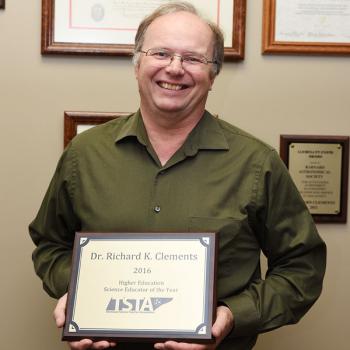For Love of All Things Living
December 15, 2016 | | Press Release

With more than 30 years of experience in the science field, Dr. Richard Clements is still excited about it and often has a hard time choosing what he wants to share with his students, “because I don’t want to leave anything out!” he exclaims. Having said that, it seems appropriate that he recently was presented with the Tennessee Science Teachers Association (TSTA) Science Educator of the Year for Higher Education on December 2. The award recognizes leadership roles in promoting science and outstanding contributions to science education that positively impact the community. Established in 1975, TSTA is the largest science educator organization in Tennessee with more than 500 members.
Like many students, Dr. Clements wasn’t always sure about becoming a teacher during the early stage of his career. His ‘phobia of public speaking’ had eased by the time he was in his master’s program at UTK, largely due to the comments by his fellow graduate students who seemed think he had a “knack for this kind of thing” after listening to his Master’s Seminar about his research. He gained the confidence to believe, “I could make a career out of this!”
Clements holds a Bachelor’s of Science degree in Biology from Tennessee Technological University, a Master’s degree in Plant Taxonomy and Floristics from UTK and a Ph.D. in Plant Ecology from the University of Kentucky, Lexington. He has called Chattanooga State home since 1994 and remembers that his first year was “extremely hectic, kind of crazy, but extremely rewarding” since he was in the middle of his dissertation, teaching, trying to sell his home and moving he and his family from Kentucky to Tennessee.
As the lead instructor for all environmental science courses at Chattanooga State, Richard takes his leadership role very seriously. “Too many people in today’s society dismiss the scientific endeavor as mere opinions and ‘theories’ that they can choose to believe or not believe. Our society has become woefully scientifically illiterate, and I want to make sure that my students understand the consequences of this situation, and the importance of being scientifically literate. Environmental Science is the perfect course for this, as it is uniquely suited to exposing students to a tremendous number of scientific concepts in the context of their personal lives,” states Clements.
“Dr. Clements is truly an outstanding educator. He engages himself and his students in hands-on projects, such as the Harrison Bay Star Walk, that really bring science from theory to practice. We are lucky to have him at Chattanooga State,” shares Dr. Dana Nichols, Vice President for Academic Affairs.
In his spare time, Dr. Clements is involved in a number of community education programs such as Tennessee Naturalist Programs, Reflection Riding Native Plant Certification classes, the Vascular Plant Taxon Leader at Reflection Riding BioBlitz, and Barnard Astronomical Society of Chattanooga, as well spending the past 30 years as leader of the Wildflower Pilgrimage in the Smokies. He enjoys hiking, natural history, photography, and astronomy. Married for 30 years to wife Heather, they have two college age sons and jokingly says, “we are owned by two rescue cats, Camo and Flash.”
For more information on environmental science classes, contact the Mathematics and Sciences Division at 423-697-4442 or visit https://www.chattanoogastate.edu/mathematics-sciences.
